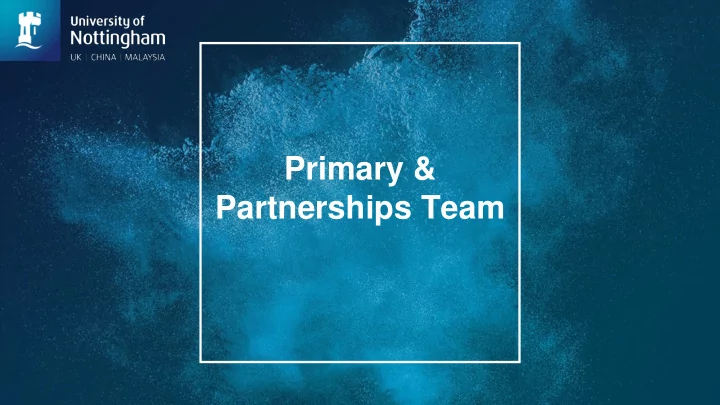

Primary & Partnerships Team
Objectives 3 Key objectives: To raise awareness of and share information about Higher Education To raise aspirations to Higher Education To encourage and promote a love of learning
Primary and PartnershipsTeam Team 2 Managers 4 Outreach Officers 1 part time Administrator Schools 100+ target schools Nottingham City/Notts County/Derbys Programme eligibility Programmes Discovery Days Family Learning Learning Leaders
Discovery Days A three part project - a campus visit, sandwiched by 2 in-school sessions KS2 – Years 3 – 6 - in collaboration with academics Pre visit – delivered a week before campus visit Visit to a University Campus – academic theme Post visit – delivered a week after campus visit Themes include Science Fair, Astronomy, Sports & Nutrition, Roboduck, Vikings, Computer Science, Local History, Ancient Greece, AmCan KS1 – Year 2 – Intro to HE/Aspiration raising Pre visit – delivered a week before campus visit Visit to a University Campus Post visit – delivered a week after campus visit
Family Learning Partnership with IntoUniversity – Academic Support Autumn – Aspiration and intro to HE session – In centre Spring – Academic related session – In centre Summer – Drop in activities and graduation – On campus Family Discovery Day/Wonder Pre visit in schools – Aspiration and intro to HE session Family Discovery Day – Academic drop in activities Wonder – Main event + afternoon tea and drop in activities
Learning Leaders – Volunteering in Schools Undergraduate Learning Leaders - Delivered in partnership with academic school Subject based sessions delivered in schools Aspiration raising input Average 250 volunteers per year Subjects; History, Philosophy, Classics, Sociology, Pharmacy, Physics and Astronomy, Psychology and Languages. Post-graduate Learning Leaders • Direct recruitment – Philosophy, Plant Sciences, Food Sciences, History, Vet-Med • Physics – Size and Scale
Learning Leaders – Aspiration activities Add on Aspiration activities Limited availability Eligibility criteria Aspiration day on campus Menu session in school – Study What You Love, Trying Your Best, Skills for Success
Partnership with IntoUniversity Primary FOCUS Primary FOCUS Weeks – Tuesday workshops and Friday ‘Graduations’ Secondary FOCUS Buddy Days for Year 8 pupils A Day of University Life (ADOUL) – Year 12/13 IUVS Mentoring scheme – recruitment, meetings in centre, graduation event Holiday FOCUS Primary or secondary – held during the school holidays
Academies Firbeck Primary Academy – Structured programme of interventions across whole school: assemblies, workshops, wow day, in-depth interventions at Year 2 and Year 6 NUAST – Range of bespoke interventions e.g. Mock interviews – careers/university, Year 12 Biology day, WES etc NUSA – Bespoke interventions e.g. Year 10 media visit
Primary Evaluation
Our Key Objectives LO1: Increase awareness and understanding of higher education LO2: Engage children in learning LO3: Raise aspirations for the future
Evaluation Tools LO1: Increase awareness and understanding of higher education Pre & post awareness questions: KS2 - ‘what is a university? Write down everything you know’ KS1 – ‘what makes a university?’ LL, DD
Evaluation tools LO2: Engage children in learning Teachers/IntoUniversity staff are asked ‘ what percent of their pupils/family members they thought were engaged throughout the session’ LL, DD, FL
Evaluation Tools LO3: Raise aspirations for the future Pre & post intervention question ‘who thinks they (their children) would like to go to university one day? LL, DD, FL
Evaluation Tools LO1, 2 & 3 Post intervention teacher survey: to what extent do you agree that the objectives were met? please can you describe the impact this project had on your pupils? Work sample photographs to show evidence of working towards the LOs
Analysis – Features and Benefits (FaBs) Comments are coded according to the FaBs that children describe: • Learning • Anyone can go to university • Route to HE • Freedom of choice • Working towards advancement • University life/campus • Future prospects • Enjoyment
Results • Teachers typically agree that our projects meet their objectives to: 1.Increase awareness and understanding of HE 97% agreed 2.Engage children in learning 99% agreed 3.Raise aspirations for the future 96% agreed • In the majority of classes (75%), children can name more fabs of university after taking part in a project. Children were more likely to associate university with the following concepts after working with us: 1.university life 119% increase 2.freedom of choice 132% increase 3.learning 13% increase • 97% of classes showed high or very high levels of engagement in learning • 98% of classes show very high levels of aspiration to higher education on completion of projects (53% increased aspiration from the project start)
Teachers thoughts “Children had the chance to learn a new subject… this meant that they were instantly engaged… lots of them have said they want to come to university when they are older.” ( Teacher, Southwark Primary School ) The best part of the project was “engaging parents who would not normally engage in school life.” ( Teacher, Sneinton St. Stephen’s C of E Primary School ) “This session was absolutely amazing! All of my children were engaged in every task and it brought some of my hard to reach children out of their shell.” ( Teacher, Wainwright Primary Academy ) “For many of our children, just having the opportunity to visit university raises their aspirations and allows them to see university in such a positive light.” ( Teacher, Dallimore Primary School ) “I believe that [my pupils] now realise that people from all backgrounds can go to university.” ( Teacher, Mansfield Primary Academy )
Challenges/group discussion • Evaluating parent/carer changes in knowledge & understanding • Collecting data via third parties eg student volunteers • Quality of answers from participants and avoiding leading questions Aspiration vs. Expectations Q. Does anyone have any ideas about measuring expectations over aspiration?
Recommend
More recommend